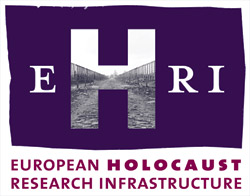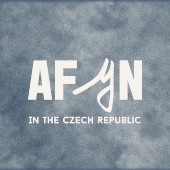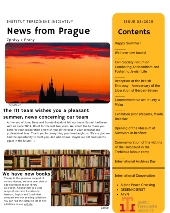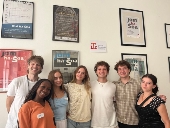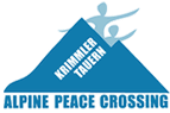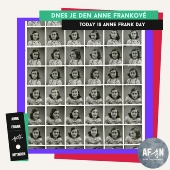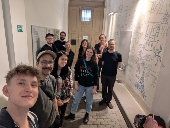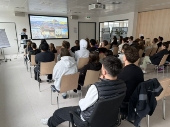Database of victims of the national socialist persecution of „gypsies“
Project objective
The project „Database of victims of the national socialist persecution of ‚gypsies‘“ contributes to the documentation of the identity and lives of those who were persecuted as so-called „Zigeuner“ on racial grounds by the National Socialists and whose fates were connected with the territory of the contemporary Czech Republic.
By systematically collecting and making available data and documents, photographs and further materials about individuals, who were persectued on racial grounds due to them being Roma or Sinti, the project aims to strenghten awareness about the genocide of Roma and Sinti in the context of Central Europe‘s modern history. Beyond that, the project aims to stimulate a broader discussion about the meaning of commemorating the events of World War II, especially taking into consideration their roots and consequences for the formation of identity of all groups in our region – as well of those belonging to society‘s majority as well as those part of minority communities – and supports the improvement of mutual relations among all groups.
1st phase
Duration
1. 6. 2016 – 31. 5. 2018
Project activities
- Processing of the materials made available or created by the historian Ctibor Nečas on the victims of the national socialist persecution of „gypsies“
- Research of relevant archival materials in Czech archives (The National Archives Prague, Moravian Provincial Archives in Brno, State Regional Archives in Třeboň).
- Development of a methodological framework for the documentation of victims of the national socialist persecution of „gypsies“ - in cooperation with members of the advisory board.
- Development of the basic structure of the database of victims of the national socialist persecution of „gyspies“, including rules for the assignment of permissions for the access to the data, archival sources and further materials to be implemented into the database; consultation of the advisory board and the project partners Museum of Roma Culture (MRK) and Documentation Centre of Austrian Resistance (DÖW) and subsequently, implementation of the results into the structure of the database.
- Systematic research for further relevant archival materials, processing of the found materials and beginning of the integration of those documents into the database.
Project outputs
- A basic structure for the database of victims of the national socialist persecution of „gypsies“, including model datasets of victims and archival materials (documents and photographs).
- Overview of archival records containing materials related to the project‘s subject.
- Establishment of a working group consisting of experts and advisers to assure the quality of the project and its further development regarding the impartation of the project‘s outputs into society‘s majority as well as into the Roma-community.
2nd phase
Duration
1. 6. 2018 – 31. 5. 2020
Project activities
- Continuation of systematic research in the National Archives in Prague, the Moravian Provincial Archive in Brno and the State Regional Archives in Třeboň.
- Systematic research in further archives within the Czech Republic and abroad (State District Archives Liberec, State District Archives Břeclav and Mikulov, The Archives of the Auschwitz-Birkenau State Museum in Oświęcim, Federal Archives Berlin).
- Digitalization of the CT Lety records in the State Regional Archives Třeboň.
- Implementation of the lists of inmates of the „gypsy camps“ in Lety u Písku, Hodonín u Kunštátu and Auschwitz-Birkenau published by Ctibor Nečas into the database.
- Compilation of selected family histories on grounds of the available archival sources and including the memories of surviving dependants and descendants of victims of the national socialist persecution of „gypsies“.
Planned project outputs
- Database containing datasets on the victims of the national socialist persecution of „gypsies“ including name, family name, date and place of birth, date and place of internment, date and place of death etc., depending on the availability of data in the archives and other sources.
- Completion of the digitalization of the CT Lety records in the State Regional Archives Třeboň.
- Several viable family histories of victims of the national socialist persecution of „gypsies“, which will serve as a means to give the public an understanding of the fate of those who fell victim to the national socialist persecution of „gypsies“.
Applicant
- Terezín Initiative Institute, Prague, Czech Republic
Project partners
- Museum of Roma Culture, Brno, Czech Republic
- Documentation Centre of Austrian Resistance, Vienna, Austria
In cooperation with
- Zentralrat Deutscher Sinti und Roma, Germany
- Fritz Bauer Institut, Germany
- KZ-Gedenkstätte Dachau, Germanny
- KZ-Gedenkstätte Flossenbürg, Germany
- Pedagogical University of Krakow Institute of Philosophy and Sociology, Poland
Members of the advisory board
- Karel Holomek, Association of Roma in Moravia, Czech Republic
- PhDr. Jana Horváthová, Museum of Roma Culture, Czech Republic
- Dr hab. Slawomir Kapralski, Prof. UP, Pedagogical University of Krakow – Institute of Philosophy and Sociology, Poland
- Mirjam-Angela Karoly, OSCE ODIHR, Poland
- Petr Lhotka, historian, Czech Republic
- Rudolf Murka, member of the second generation, Czech Republic
- Dr. Jörg Osterloh, Fritz Bauer Institute, Germany
- Frank Reuter, Central Council of German Sinti and Roma, Germany
- Čeněk Růžička, Committee for the compensation of Roma-victims of the holocaust, Czech Republic
- Helena Sadílková, Ph.D., Department for Romani Studies, Chair for Central European Studies, Faculty of Philosophy, Charles University Prague, Czech Republic
- Marek Szilvási, Europen Roma Rights Centre, Hungary
The Project is supported by
Three weeks have already passed since the International Youth Forum started in South Carolina, hosted by the Anne Frank Center at the University of South Carolina (USC). Our very own Ani from Afyn.cz was one of the delegates. She has shared her reflections on the experience, what she learnt, and what she will take away from it. Read her report to get a glimpse of the IYF 2025!
It's the middle of summer, and we're bringing you the latest issue of our newsletter, News from Prague. We wish you a wonderful rest of your vacation and enjoyable reading.
This week, a group of students from the US (some with Czech family ties) has visited us as part of their summer school in the Czech Republic organised by the Mestenhauser Institute for International Collaboration (MIIC).
Our GEDENKDIENST-Volunteer Laurenz joined the Alpine Peace Crossing (APC) in Krimml to cross the Austrian Alps in remembrance of the thousands of Jews who fled the antisemitism that was still rampant in Europe after 1945. Laurenz welcomed the team to Jachymka a few weeks ago.
Yesterday we celebrated Anne Frank's legacy in a creative way by showcasing the artworks submitted by talented contributors at Žižcafé Therapy.
On Saturday our GEDENKDIENST volunteer Laurenz welcomed the team of the Alpine Peace Crossing to Jachymka to show them our work.
Alpine Peace Crossing (APC) is an Austrian organization based in Krimml (Salzburg province).
Our Volunteer Laurenz was in Austria last week to promote the GEDENKDIENST program at his former school, the HAK 1 in Salzburg. Speaking to about 60 people from the 4th grade he talked about his experiences and encouraged the students to also use the opportunity to do a Gap-Year with a positive impact. Besides the remembrance work and the work and history of our institute, Laurenz told the students about the challenges and the many wonderful things that come with moving abroad and starting a new job fresh out of school.
We want to thank the HAK 1 business school in Salzburg for giving Laurenz the opportunity to promote the program and the students for their keen interest.







